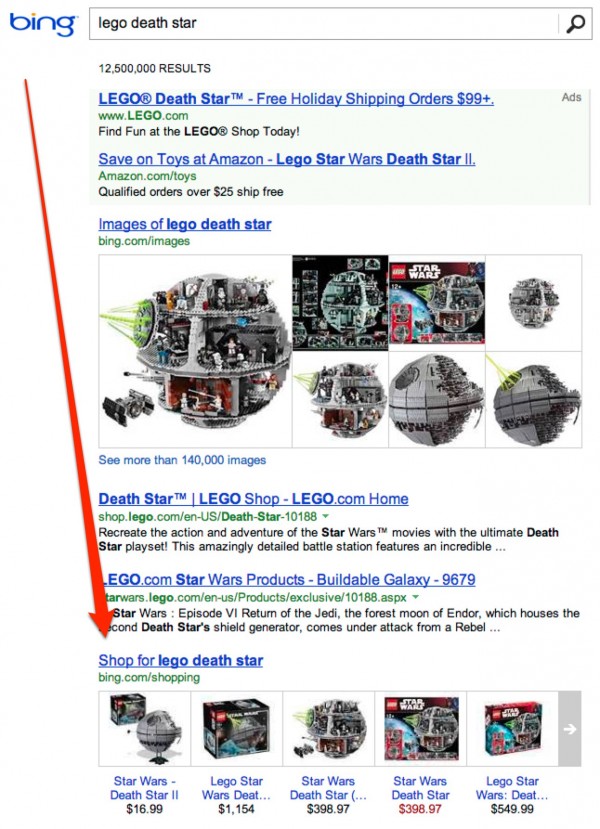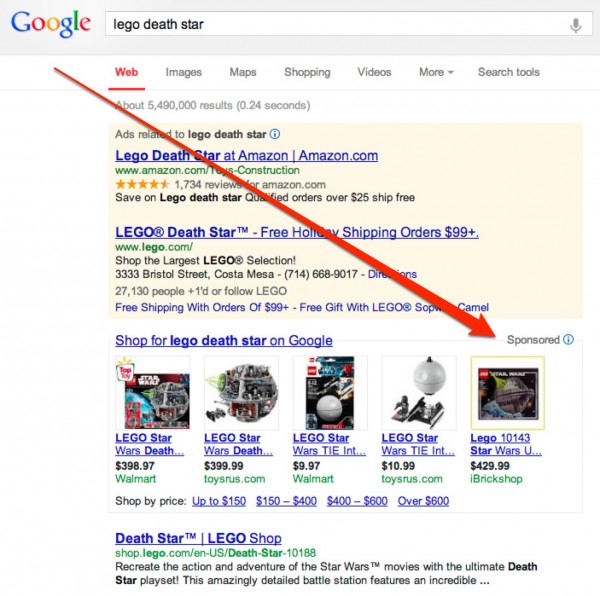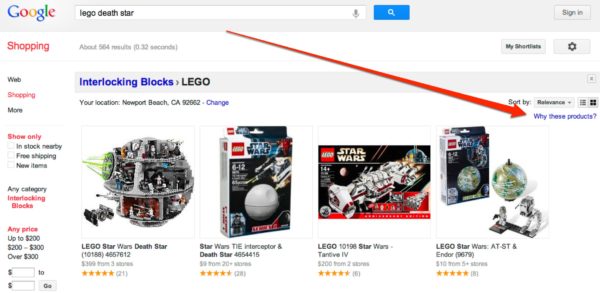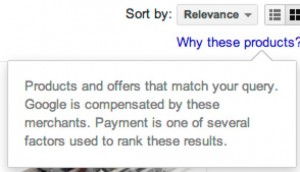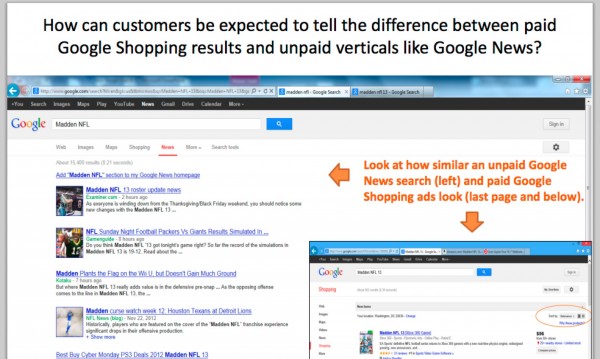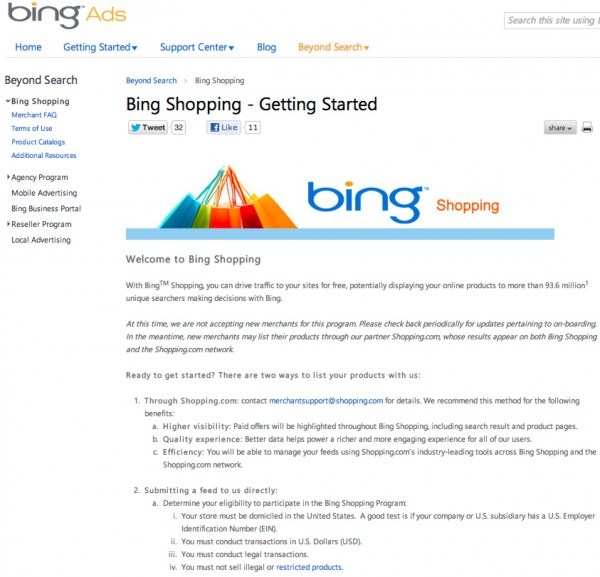Bing Attacks Google Shopping With “Scroogled” Campaign, Forgets It’s Guilty Of Same Problems
Bing is attacking Google over its shift to a pay-for-play shopping search engine through a new “Scroogled” site, pledging that Bing has “honest search.” Great campaign, if it were true. It’s not. Bing itself does the same things it accuses Google of. It’s also another indictment of how little the FTC is doing to protect […]
Bing is attacking Google over its shift to a pay-for-play shopping search engine through a new “Scroogled” site, pledging that Bing has “honest search.” Great campaign, if it were true. It’s not. Bing itself does the same things it accuses Google of. It’s also another indictment of how little the FTC is doing to protect consumers from “search results” they might not realize are ads.
Google Shopping Goes All-Ads
Earlier this year, Google changed to a “paid inclusion” or pay-to-play model of accepting listings for its Google Shopping site. Phased in over the summer, as of October 17, only merchants who pay appear in the search engine, within the US (the change will expand globally over the coming year).
The change is remarkable for two reasons. First, it was a complete reversal of Google’s long-standing fight against paid inclusion programs, something it once labeled as evil. It also hasn’t resulted in a massively improved shopping search as Google promised. I’ve covered both in detail in my stories below:
- Once Deemed Evil, Google Now Embraces “Paid Inclusion”
- Google Product Search To Become Google Shopping, Use Pay-To-Play Model
- The Mess That Is Google Shopping
Bing’s “Scroogled” Campaign
Enter Bing, which launched its Scroogle site attacking Google over these changes:
The site highlights the change at Google to an all-ad system and how this shift may harm consumers:
Google admits they’ve now built “a purely commercial model” that delivers listings ranked by “bid price.” Google Shopping is nothing more than a list of targeted ads that unsuspecting customers assume are search results. They call these “Product Listing Ads” a “truly great search.”
We say that when you limit choices and rank them by payment, consumers get Scroogled. For an honest search result, try Bing.
There’s also a blog post out from Bing today making similar charges and attacking Google over a lack of clear disclosure:
Shoppers visit the site they have used for years, conduct what they think is a “search,” and get a set of rankings that look like the objective results Google delivers elsewhere. Meanwhile, the lawyers at Google are now calling it a “listing.” They even call out – hidden behind a disclaimer or buried in a footer — “Payment is one of several factors used to rank these results.”
Comparing The “Honesty” Of Google & Bing
I’ve been one of the biggest critics about Google’s change, which has indeed been largely under-the-radar. Unfortunately, Bing is hardly in a position to be lecturing Google about poor disclosure and charging for listings, when it has the same issues.
Here’s a search on Bing for “lego death star,” which brings up Bing Shopping results inserted into the listings:
Here’s the same search on Google, which also inserts its shopping results:
The key difference is that Google’s results have a “Sponsored” disclaimer over it, one that even expands with more information if you over over the label (though few likely do this). Bing has no such disclaimer, despite the fact that some of its listings come through merchants paying to appear.
Let’s drill into both, now seeing what appears within the shopping search area itself. Here’s what Bing shows:
The arrow highlights a new disclosure that Bing has added as part of its attack on Google, a reassuring statement that says:
Payment is NOT a factor used to rank search results in Bing.
As I’ll explain, payment is indeed a factor, which to me makes this disclosure for consumers untrue. But first, let’s look at what Google does:
Off to the right, Google has a “Why these products?” message, which appears to be Google’s attempt to meet the US Federal Trade Commission requirements for disclosure of paid inclusion listings. If you click on it (which again, few are likely to do), you get this further explanation:
It says:
Products and offers that match your query. Google is compensated by these merchants. Payment is one of several factors used to rank these results.
Bing’s own disclaimer is clearly keying off of Google’s disclosure, using similar language to highlight that at Google, while payment is a factor used to rank results, at the honest search engine of Bing, it is not.
Can Consumers Tell What’s Paid For?
Back on the Scroogle site, Bing also stresses that this type of disclosure is so unclear that consumers can’t be expected to tell what’s paid and what’s not, comparing Google Shopping and Google News together:
I’d be applauding Bing for making this point, something I stressed to the FTC myself with my letter about poor search engine disclosures earlier this year, but instead I find myself in the odd position of having to point out that Bing makes this point better through its own poor disclosure.
Bing’s Lack Of Disclosure
How can consumers know what’s paid and what’s not? If that’s the issue Bing is concerned about, it not only fails to explain this at Bing Shopping but worse suggests that payment isn’t involved, when it is.
How does Bing Shopping get its results? Despite a 1,000 word blog post explaining all that’s wrong with the Google Shopping model, Bing never explains the Bing Shopping process. Nor does the help page at Bing Shopping explain this. That new disclaimer doesn’t explain it, either. It implies that Bing Shopping somehow lists all relevant merchants for free. That’s not the case.
If you’re a merchant, and you know where to look (a place a consumer almost certainly won’t stumble upon), you get to this page about getting listed in Bing Shopping:
The page highlights that there is currently only one way to get listed in Bing Shopping, which is to submit to Shopping.com, which lists people who agree to pay.
Bing’s Pay-To-Play Program
In other words, if you want to be in Bing, you have to pay — exactly like Google. Moreover, the page says that merchants doing this will get:
Higher visibility: Paid offers will be highlighted throughout Bing Shopping, including search result and product pages.
Higher visibility in search results? You mean you’ll rank better in search results, by paying to be listed? In the search results that Bing just told consumers that payment isn’t a factor?
Now as it turns out, after talking with Bing today, it’s not as simple as all that. But from a consumer standpoint, which is what this entire campaign that Bing has launched is about, it does appear Bing is being completely hypocritical, based on information out there in the public view.
Bing Responds
I put all this to Bing director Stefan Weitz. First up, how can Bing launch such an attack on Google’s all-paid model when it apparently just removed the free submission option that it used to offer. That page above, that I mentioned about getting listed, says this:
At this time, we are not accepting new merchants for this program. Please check back periodically for updates pertaining to on-boarding. In the meantime, new merchants may list their products through our partner Shopping.com, whose results appear on both Bing Shopping and the Shopping.com network.
That restriction, the dropping of the free listing program, was just added to that page in the past few days (it wasn’t there when I looked last week), though apparently it started back on September 12.
Bing: Free Submissions Closed Temporarily
Weitz said that the program has only been dropped temporarily, something he said Bing did last year, as well, just ahead of the holiday shopping period, to better protect the quality of its results from merchants who might try to get into the rush period with duplicate products. Plans are to restore this after the New Year.
Ironically, this is the same argument Google has used about not taking free listings — that it will supposedly lead to better quality, so Bing’s “temporary” closure seems to support Google here.
Bing’s temporary closure also raises alarm bells given how last year, several major “Black Friday” sites found themselves mysteriously dropped for nearly a month, just before Black Friday hit:
Bing: Most Shopping Results Aren’t Paid
Weitz also said that the most listings within Bing Shopping come from merchants who are already in the free listings program and through Bing’s crawling of the web. “We don’t get paid for the majority of products in there,” he explained.
All that was news to me. All that would be news to any consumer, because as I’ve covered, Bing doesn’t explain how Bing Shopping works to consumers. To merchants, the implication is that it’s pay-to-play through Shopping.com (and that’s definitely that case for any new merchant who comes right now).
The Payment As Ranking Factor Issue
What about that claim to consumers that at Bing Shopping, “payment is not a factor used to rank results.” Clearly some merchants only get listed because they paid to be included in Shopping.com, which in turn got them listed in Bing. Payment isn’t the primary factor for ranking well, but it is a factor for these companies. If they didn’t pay, they wouldn’t have a chance to rank at all.
“There’s paid inclusion and there’s pay-to-rank,” Weitz said. “That’s a far different scenario than having to pay Google to be there,” he explained.
The point Weitz’s is trying to make is that with Google, if you don’t pay, you have no chance of ranking at all, because you don’t get included at all. With Bing Shopping, paying is one way of being included, but not the only way, so he doesn’t count that as a ranking factor.
He further stressed that Bing doesn’t know how much people are willing to pay to Shopping.com, so payment is further insulated from having an impact.
“The fact someone did pay to be in Shopping.com, to us, it looks just like any other [non-paying] merchant. To us that someone paid does not effect the ranking in those organic listings,” Weitz said.
Weitz even further argued that technically, paid inclusion isn’t even happening at Bing since Shopping.com merchants don’t pay until someone’s actually clicked on a link and gone on to purchase an item.
What about the section in the Bing “getting listed” page that talks about gaining higher visibility by paying, something that also gets covered in the Bing Merchant Integration Guide:
Higher visibility is again touted, including “exposure within Bing’s editorial content.”
Weitz said this isn’t about ranking better but instead that merchants might get pulled out as a “sponsored offer” highlight or in other ways. That may be the case, but it sure reads to potential merchants as if using Shopping.com means they’ll rank better.
Weitz also told me, “We need to do a better job explaining the shopping system” to consumers.
Payment Is A Factor; Doesn’t Control Ranking With Either
Overall, Weitz makes some good points, but I still think the claim that payment isn’t a factor doesn’t hold up. Even if only some people are paying to be included, that payment is still a factor in whether they’ll ultimately rank.
In addition, Google — and it reconfirmed this for me — isn’t just ranking merchants first because they pay the most. As with all of Google’s ads, how much an advertiser will pay is one of several factors that controls if they’ll rank better.
But the Scroogle site misleadingly — and in multiple ways — suggests that Google simply ranks merchants by payment. For example, a video on the site has this segment saying results are sold to the highest bidder:
That’s just not true. Results are sold; only those who pay are included, but it’s not high bid wins.
Why Isn’t The FTC Enforcing Its Consumer Guidelines?
This leads to what I feel is the far bigger issue, that consumers may find it difficult to understand what’s a paid listing or not at Google, Bing or any number of search engines, despite the FTC having guidelines that are supposed to help here.
It’s so bad that twice now, we’ve had Google competitors publicly attack Google over supposedly poor disclosure despite having bad or no disclosure themselves.
In June, Nextag CEO Jeffrey Katz penned a well-cited letter in the Wall Street Journal attacking Google’s supposed lack of consumer transparency. He was unconcerned that Nextag itself wasn’t doing, as best I can tell, the proper disclosure of its paid inclusion program required by the FTC. My article from then explains more:
- Given Nextag’s Lack Of Transparency, Its WSJ Opinion Piece Asking For Google Transparency Isn’t Wise
Now we have Bing attacking Google over disclosure, and it’s deja vu. Bing Shopping does paid inclusion. Until last week, it wasn’t disclosing this in a way that would seem to have met the FTC guidelines. This week, it’s arguably doing misleading disclosure, as part of a campaign to attack Google about disclosure?
I asked Weitz if he felt Bing was doing disclosure as required by the FTC. His response? He needed to check with Microsoft’s lawyers.
Wrong response. The correct answer is yes, because if you’re a search engine, then your executives should absolutely know 100% that your company believes it is doing the required disclosure. Google certainly does. Whenever I’ve asked, or seen them asked about this topic, they’ve said yes.
That doesn’t mean that everyone will agree that consumers feel Google’s disclosures are useful, of course. But at least it tries, in many places. That competitors who don’t even try at disclosure attack Google on the topic is mind-boggling, depressing, a sad indictment that the search engine industry really doesn’t seem to care about the FTC’s rules.
Then again, why should they? The FTC doesn’t. It’s never taken an enforcement action over its disclosure guidelines despite the rules being on the books for the past 10 years. I can’t even get the FTC to formally admit they’re looking at the issue despite rumors it might be — and probably only are because of my letter to them this year.
Google’s Change Is Disappointing
I’ll leave with two takeaways from all this.
First, that Bing has stumbled in its attack doesn’t take away from the fact that Google has dramatically changed from an inclusive shopping search to one that’s motivated about payment.
As a searcher, you won’t find products sold directly through Amazon on Google Shopping because Amazon won’t pay. That’s a loss for searchers, and one that Google could fix by ensuring that Amazon and any important merchants are carried for free (Bing, by the way, tells me it does carry Amazon for free).
It’s a shame that Google has moved away from its inclusive roots. Again, my previous stories that cover this more:
- Google Product Search To Become Google Shopping, Use Pay-To-Play Model
- The Mess That Is Google Shopping
By the way, Google’s statement today about the issues that Scroogle raises pushes back on this:
Google Shopping makes it easier for shoppers to quickly find what they’re looking for, compare different products and connect with merchants to make a purchase. With new 360-degree, interactive product images, social shopping lists and a fast growing inventory of more than a billion products worldwide, Google is a great resource for shoppers to find what they need, at great prices for their loved ones this holiday season.”
As for disclosure, it said:
Google Shopping results are clearly labeled “sponsored” on our search results pages as a clear guide to users
Lack Of Consumer Protection Is Disappointing
Second, the fact that competitors feel empowered to attack Google on this topic despite their own failures is, as I said, an indictment of the FTC.
The agency has spent so much time focusing on anti-competition issues that it’s neglected the basic definition of what a search engine is, what search listings are and how those are properly disclosed.
As I said in my letter to the FTC in June, without those type of definitions, trying to undertake an anti-trust review seems futile:
Now that Google is turning former search engines like Google Product Search into paid inclusion/advertising products like Google Shopping, the definitions are even more important — and not just for the handful of competitors claiming an issue with Google but for the millions of consumers that use these search engines sometimes without clear disclosure of why they get certain results….
I understand that the FTC has been mostly involved at late investigating whether consumers are being harmed by possible anti-competitive actions of Google. However, the FTC also has a role in protecting consumers from misleading and confusing advertising across all search engines. A review of your guidelines would be especially helpful given changes in the space now and perhaps necessary for any proper anti-trust review you’re doing.
More about the FTC’s role with guidelines can be found in my stories below:
- A Letter To The FTC Regarding Search Engine Disclosure Compliance
- On Google Earnings Call, Google Ignores FTC Definition Of “Paid Inclusion”
- SEMPO: FTC Is “Strongly Considering” Review Of How Search Engines Disclose Paid Listings
Finally, one last note. I was somewhat surprised Bing went with the “Scroogled” name given that until earlier this year, there was a long-standing “Scroogle” search engine that started out way back in 2003 as a protest over ranking changes at Google seemed designed to some by Google to boost its bottom line. It felt like Bing could have come up with a different name.
Contributing authors are invited to create content for Search Engine Land and are chosen for their expertise and contribution to the search community. Our contributors work under the oversight of the editorial staff and contributions are checked for quality and relevance to our readers. The opinions they express are their own.
Related stories
New on Search Engine Land

